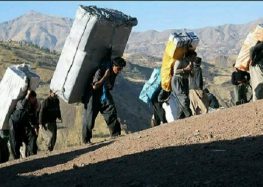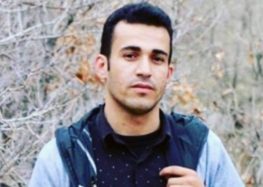Attorney Calls Out Local Governor For “Empty” Promises to Iran’s “Kulbar” Border Couriers
 An attorney representing Iranian border couriers, “kulbar” in Farsi, has criticized a local governor in northwestern Iran for making “unreasonable” and “empty” promises of financial assistance to the impoverished, unlicensed tradesmen.
An attorney representing Iranian border couriers, “kulbar” in Farsi, has criticized a local governor in northwestern Iran for making “unreasonable” and “empty” promises of financial assistance to the impoverished, unlicensed tradesmen.
On September 11, 2017, the governor of the city of Baneh, in Kurdistan Province, made the unusual pledge that all kulbars living within a nine-mile radius of the city would receive 500,000 tomans ($151 USD) in monthly stipends and employment insurance.
“Those in need of insurance have been identified and issued insurance books,” added Mohammad Fallahi. “These kulbars will be guided toward Siranband Bazaar, where they will enjoy services and facilities.”
In an interview with the Center for Human Rights in Iran (CHRI), attorney Hossein Ahmadiniaz responded that the couriers need “policies based on reality, not slogans.”
“The governor’s statements are baseless. He’s just talking without having any real plan,” said Ahmadiniaz in an interview with CHRI on September 12, 2017.
“Where is the money going to come from? Is there a budget? From what source?” he said. “Let a few months pass and you will see nothing has changed for the kulbars.”
“The sad reality facing kulbars will end only if the government pursues actions based on reality,” he added.
The attorney noted that a significant portion of the economy in Iran’s provinces bordering Iraq and Turkey, mainly in the cities of Baneh, Piranshahr, Sardasht and Marivan, depends on the couriers, who carry goods on their backs, on foot or on mules and horses, through treacherous mountain trails.
The men, most of whom do not have official work permits, work under the constant threat of being shot by Iranian border guards, as well as death from natural disasters, such as avalanches and rock slides.
“As someone who represents many kulbars, I know there are kulbars as young as 13 in this trade, as well as old men,” Ahmadiniaz told CHRI.
The minimum working age in Iran is 18, according to Article 84 of Iran’s Labor Law.
“Carrying heavy goods such as refrigerators, ovens and television sets through long distances leaves them physically disabled in a short time and without health insurance, they can’t get treatment,” he added.
“In addition, there are those who fall to their deaths in valleys or are killed or injured by border guards,” he said. “Nobody really knows the real number of these victims.”
On September 4, 2017, two kulbars, Heydar Faraji (21) and Ghader Bahrami (45), were shot to death by Iranian border guards near Baneh, resulting in protests in several cities in the region, including on September 5 when the families of the victims and dozens of other people gathered in front of the local governor’s office in Baneh.
At least 92 kulbars were killed in 2016, a 27 percent increase compared to the previous year, according to the Kurdistan Human Rights Network (KHRN). Border guards were responsible for forty of the deaths.
In its report, “Dangerous Borders: Documenting the Killings of Couriers in Iran’s Western Provinces,” CHRI called on the Iranian government to stop border guards from using lethal force against the impoverished and vulnerable kulbars and provide them legal status.






